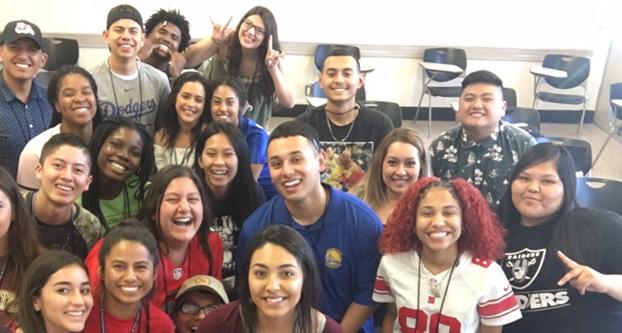A few days ago, I woke up to get ready for work. Like any other day, I rubbed my eyes, took a deep sigh and went to turn off the alarm clock. When I looked at my phone, I noticed the battery wasn’t fully charged. I figured I forgot to connect the charger into my phone the night before. Moments later, I tried turning on the television to watch the local morning news. Staring at a blank screen, I then realized the power was out. No power meant my normal morning routine was now out of sync and I knew it was going to be “one of those days.”
On my way to work, I called PG&E to notify them about the situation. Within minutes, they informed me they were working on restoring the power throughout the neighborhood. After hanging up, I felt reassured to know there was a team already looking into the situation and eager to help. Feeling like myself again, I continued my daily commute.
As an academic counselor, there are major opportunities to help restore power for our students in the Central Valley. Sometimes the issues are academically related, while others are mental, emotional, or hamper the physical well-being of the student. Over the past several years, I have had the opportunity to work at a number of school districts. From kindergarten to college adults of all ages and backgrounds, I have helped students discover and restore their power. It is through these experiences that one is reminded one never knows what someone else is going through beneath the surface.
According to aChildren Nowreport, 39 percent of children in Fresno County are living in poverty and 33 percent of adolescents are at risk for depression. Additionally, 60 percent of students reported not feeling connected to their schools. In order to learn more, researchers have examined the lasting effects on children who have been exposed to stressful or traumatic events throughout their lifetime. Most commonly known as Adverse Childhood Experiences, such traumas occur across all races, regions and socio-economic classes. ACEs include physical, emotional or sexual abuse; physical or emotional neglect; parental mental illness, substance abuse and incarceration; parental separation or divorce; or domestic violence.
Studies have shown children exposed to a higher number of ACEs are more likely to struggle with behavioral and emotional problems that can lead to negative social, physical and mental health outcomes. The repeated trauma or exposure over a long period causes an overload of stress hormones to be released, which affects normal brain development.
Reports indicate that one in 10 children nationally have experienced three or more ACEs.
Researchers have found economic hardships and parental separation or divorce as the most common of all ACEs. According to Child Trends, a nonprofit research organization, Caucasian children also readily experience living with an adult who has a mental illness. Equally stigmatizing, Hispanic and African-American children are reported for having an incarcerated parent. Perhaps most debilitating, studies show Caucasian and Hispanic children suffer from the effects of living with an adult who has a substance abuse problem.
Unfortunately, there is no cure for ACEs; however, there are strategies to prevent the number of negative effects. Scholars have emphasized the importance of positive and stable relationships. Studies have found children with positive, supportive relationships are better able to manage their emotions and more likely to develop positive social-emotional skills. The benefits of supportive relationships may also help students reduce the amount of toxic stress while assisting in improving behavioral adjustment skills.
The numbers listed above do not define our students or predict their outcomes. Many children in Fresno County beat the odds and are the trailblazers for success. They are bold, resilient and ready to break down the barriers of generational poverty.
My call to action today is to focus on restoring the power of our students. Continue checking in with them and learn more about them. Ask open ended questions and show them we are “academic technicians” willing to help. And when they express their feelings, listen carefully to the tone and word choice in their responses. Most importantly, avoid judgment. Try putting yourself in their shoes and viewing the world from their lens. Find out if their power needs a boost; you just might be the person they need, or you can help build the team of support around them.
With the new school year, I am excited to meet and learn more about the students here in Fresno County. I urge every current and future educator to keep an eye out for those with their power flickering. This is not just about improving our schools; it is morally and socially imperative that we consider the well-being of every child in the Central Valley. With their power restored, every student has a chance at success ”” even those who experience “one of those days” every day.





